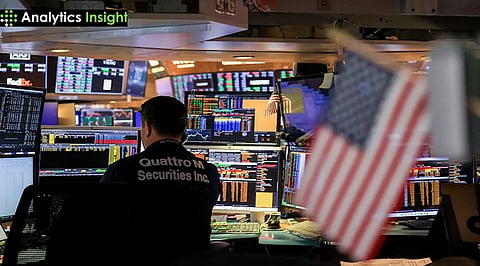

Global equities climbed on Monday as optimism grew around a potential trade agreement between the United States and China. The S&P 500 gained 1% by midday in New York, while the Nasdaq 100 rose 1.6%. The Dow Jones Industrial Average added 0.5%, and the Stoxx Europe 600 remained little changed.
The MSCI World Index advanced 0.8%, reflecting broad-based strength across global markets. A gauge tracking the “Magnificent Seven” technology giants surged 2.4%, driving the rally in large-cap growth stocks.
The upbeat sentiment came as negotiators from Washington and Beijing finalized details ahead of a meeting between President Donald Trump and Chinese President Xi Jinping.
Investors anticipate that the leaders will sign multiple trade agreements involving tariffs, shipping costs, and export regulations. In addition, the possibility of a deal, along with expectations of additional Federal Reserve rate cuts, boosted confidence among risk assets. Analysts noted that the combination of looser monetary policy and better earnings forecasts has established a positive environment for equities.
Furthermore, the rally broadened to smaller-cap stocks, with the Russell 2000 Index increasing by 0.3%. Bonds experienced minor fluctuations as yields rose slightly, with the 10-year US Treasury yield increasing one basis point to 4.01%. The dollar held steady, while the euro traded at $1.1635 and the British pound edged up to $1.3327. Gold fell sharply, dropping 3% to $3,989.46 per ounce, as investors moved toward riskier assets.
Several major corporate announcements affected sentiment. Qualcomm Inc. surged after unveiling new chips designed for artificial intelligence data centers, positioning itself to compete with Nvidia Corp. in the fast-growing AI market.
Nvidia, which has faced restrictions on chip sales to China, is set to hold a major AI conference in Washington this week, coinciding with the anticipated US-China trade summit. Meanwhile, Microsoft Corp. received an upgrade from Guggenheim ahead of its quarterly results, which reflects growing optimism about its cloud and AI businesses.
In addition to corporate news, Berkshire Hathaway was assigned a rare "sell" rating due to concerns about its future leadership and macroeconomic risks. IBM announced a new blockchain-based digital assets platform as part of its expansion into financial technology.
Furthermore, Huntington Bancshares and American Water Works announced significant acquisition deals worth $7.4 billion and $12 billion, respectively, signifying further convergence among the US regional banks and utilities.
In the consumer sector, Keurig Dr Pepper announced it will raise $7 billion from private equity firms Apollo and KKR to fund its acquisition of JDE Peet’s NV Lululemon Athletica entered a partnership with the NFL and Fanatics Inc. to produce fan apparel.
At the same time, Cigna Group announced it would eliminate prescription drug rebates in many of its plans starting in 2027. Novartis agreed to acquire Avidity Biosciences for $12 billion, marking its largest deal in over a decade.
Also Read: China’s $1 Billion-a-Day Exports Underscore Xi Jinping’s Trade Leverage Amid Ongoing US Tariffs
The upcoming earnings reports from major technology firms are expected to determine the next phase of the market rally. Microsoft, Alphabet, Meta Platforms, Amazon.com, and Apple, which together represent about a quarter of the S&P 500’s market capitalization, are scheduled to report results this week. Analysts forecast the group will post profit growth of 14% for the third quarter, lower than the previous quarter but still strong given broader economic uncertainty.
Market strategists emphasized that capital spending among tech giants remains strong. Total expenditures by Microsoft, Alphabet, Amazon, and Meta are expected to reach $360 billion this year and could rise to $420 billion next year, with a large portion dedicated to AI infrastructure. Investors still see artificial intelligence as a key driver of long-term profit growth, despite growing competition and higher spending levels.
Analysts from UBS, HSBC, and Morgan Stanley have said that stocks are likely to continue performing strongly in 2026, supported by robust earnings, improved trade relations, and expected reductions in the Fed's interest rates.
Although a few fund managers have issued recent warnings, market positioning has become more optimistic as risk appetite rebounds. A combination of solid fundamentals, a relaxed policy environment, and strong corporate performance is expected to support global market resilience, according to one strategist.
